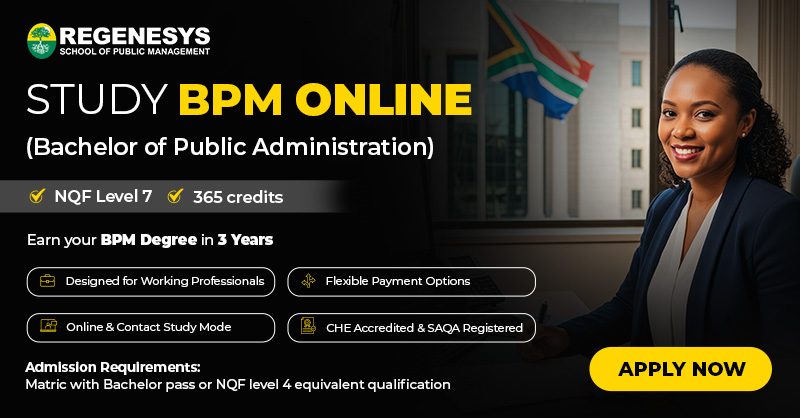Public Management refers to the professional discipline that governs how public sector organisations deliver services, manage budgets, craft policy and serve communities. In South Africa, demand for skilled public administrators is rising as transformation and efficient governance become central priorities. For professionals considering a second degree, a Bachelor of Public Management (BPM) offers a direct route into impactful public service roles. This degree builds competence in Public Management education and also opens pathways to leadership in government, NGOs or development institutions.
In this article, we will explore the benefits of BPM as a second degree in South Africa, the credit transfers, flexibility, career alignment after graduation and more.
Table of Contents
- Understanding the Role of Public Management in South Africa
- Why Public Management Is a Smart Second Career Choice in South Africa
- Who Should Consider a Bachelor of Public Management (BPM)?
- How Many Subjects Does Public Management Have?
- Learning Flexibility: Online Study
- Work-Study Balance: Managing Your Career While Pursuing BPM
- Skills You Will Develop Through the BPM Programme
- Conclusion
- BPM as a second degree in South Africa – FAQ
Understanding the Role of Public Management in South Africa
In South Africa, skilled public managers are critical for bridging the gap between policy formulation and real-world impact. They are not only administrators but also leaders who align governance systems with the nation’s development priorities.
Public Management is central to how South Africa’s government and public institutions function. It is not only about administration but also about ensuring that resources, policies, and programmes serve citizens effectively and sustainably.
Some of the main aspects of Public Management in South Africa include:
1. Service delivery – Managing public services such as healthcare, education, housing, and infrastructure to meet the needs of communities.
2. Resource allocation – Ensuring limited financial and human resources are used efficiently and transparently.
3. Policy implementation – Translating national and provincial policies into action at municipal and community levels.
4. Accountability and ethics – Promoting good governance, ethical decision-making, and reducing corruption within public institutions.
5. Stakeholder engagement – Collaborating with citizens, businesses, and NGOs to ensure inclusive governance.
6. Problem-solving for development – Addressing issues such as inequality, unemployment, and poverty through strategic planning and innovative programmes.

Why Public Management Is a Smart Second Career Choice in South Africa
For many professionals who already hold a qualification, private sector careers may feel limited in terms of wider social contribution. Choosing BPM as a second degree in South Africa allows individuals to step into roles that influence governance, service delivery and policy development. A second degree in South Africa that focuses on Public Management provides a unique chance to combine existing expertise with the specialised skills needed for impactful leadership.
The Bachelor of Public Management at Regenesys is:
1. Accredited and recognised – Registered with SAQA and accredited by the CHE, the programme is aligned with NQF Level 7, carrying 365 credits.
2. Focused on transformation – Equips students with the tools to navigate South Africa’s evolving governance landscape.
3. Designed for relevance – Core modules cover Economics, Public Management, and Public Finance, all areas essential for effective Public Management education in SA.
4. Strategic for professionals – Ideal for mature learners with experience who wish to transition into the public sector while retaining the advantage of their first degree.
In essence, pursuing BPM as a second degree in South Africa is both a professional and personal investment: it strengthens employability, builds critical leadership skills, and allows graduates to contribute meaningfully to society.
Read more on A Comprehensive Guide To Bachelor Of Public Management here
Who Should Consider a Bachelor of Public Management (BPM)?
BPM as a second degree in South Africa, for certain individuals, can be a transformative step. This qualification is particularly suited to professionals who already have a first degree yet feel drawn to public service and governance.
By aligning previous academic learning with Public Management education in SA, students gain the confidence and competence to transition into impactful roles within government, NGOs, or community-focused organisations.
The programme is especially beneficial for:
1. Working professionals – Those employed in the private sector who want to shift towards careers with broader societal impact.
2. Graduates from diverse fields – Holders of degrees in business, humanities, sciences or related areas who want to complement their expertise with BPM as a second degree in South Africa.
3. Aspiring public leaders – People motivated by improving service delivery, policy development and governance structures.
Ultimately, BPM as a second degree in South Africa is ideal for those committed to using education as a stepping-stone into leadership and service. It bridges existing knowledge with the specialised skills needed to succeed in Public Management and to make a measurable difference in society.
Read more on Work-Life-Academics Balance: Juggling BPM Studies, Job & Family here
How Many Subjects Does Public Management Have?
The Bachelor of Public Management (BPM) is designed to provide a comprehensive understanding of governance, policy, and administration. Over the three-year full-time programme, students complete core modules each year and may also choose elective subjects to tailor their learning to specific career goals.
Core subjects across the BPM programme include:
- Economics: Study of resource allocation, economic principles, and public sector impacts.
- Public Finance Management: Budgeting, financial planning, and efficient use of public funds.
- Public Human Resource Management: Managing personnel, performance, and labour relations in public organisations.
- Public Management: Overview of public administration, organisational structures, and service delivery.
- Public Policy Management: Designing, implementing, and evaluating effective public policies.
- Public Strategic Management: Planning, strategy development, and leadership for achieving public goals
In addition to these core subjects, students can select elective modules in areas such as local government management, public ethics, or monitoring and evaluation. Altogether, the BPM programme balances a set of core modules and electives, giving students both foundational knowledge and the flexibility to specialise in areas aligned with their career ambitions.
This structure ensures that graduates emerge with both breadth and depth of knowledge, equipping them to handle complex challenges in public management while remaining adaptable to different roles in government, NGOs, or development institutions.

Learning Flexibility: Online Study
Regenesys recognises that many professionals considering BPM as a second degree in South Africa need study modes that adapt to their busy schedules. The October intake is offered entirely online, making it possible for students across South Africa to enrol without the need to relocate or disrupt their current commitments.
Online learning through Regenesys provides several benefits, such as:
- Accessibility: Study from anywhere in South Africa, removing geographical barriers to Public Management education in SA.
- Flexibility: Live virtual lectures, recorded sessions, and discussion forums allow learners to manage their own pace.
- Work-study balance: Professionals can integrate studies with their careers and family responsibilities.
- Supportive learning: Access to academic coaching, digital resources, and collaborative group activities ensures that online students feel fully supported.
- Cost-effective: Reduced travel and relocation expenses make BPM as a second degree in South Africa more affordable and practical.
With these flexible study modes, mature learners in BPM can progress confidently through their studies while continuing to meet their professional and personal obligations. The October intake’s online delivery makes now the ideal time to start your BPM as a second degree in South Africa.
Work-Study Balance: Managing Your Career While Pursuing BPM
For many professionals, the thought of adding a second qualification to an already demanding schedule may feel overwhelming. Yet pursuing BPM as a second degree in South Africa is entirely achievable with the right approach. Regenesys has designed the Bachelor of Public Management with mature learners in mind, to help students succeed both academically and professionally.
Balancing a career with studies requires careful planning and discipline. Here are practical strategies that students often find effective:
Structured scheduling – Set aside consistent study blocks during early mornings, evenings, or weekends to build momentum.
Leveraging online resources – Use recorded lectures, interactive modules, and digital libraries for time-efficient revision.
Active participation – Engage in faculty-led discussions and group projects to reinforce learning and stay motivated.
Workplace integration – Apply concepts from the BPM curriculum directly to your job, turning assignments into real-world learning opportunities.
Self-care and support – Make use of Regenesys’s wellbeing services, mentorship programmes, and academic advising to maintain balance.
The programme’s design acknowledges that many students are mature learners in BPM, often employed full-time or managing family responsibilities. With flexibility built into the October online intake, Regenesys makes it possible to sustain professional performance while progressing through a recognised second degree in South Africa.
Choosing this path means that education becomes a complement to your career rather than a disruption, equipping you with the tools to manage work, life, and study in harmony.
Read more on The Future of Public Management (BPM) Education: Trends to Watch here
Skills You Will Develop Through the BPM Programme
Pursuing BPM as a second degree in South Africa offers more than a qualification: it builds a comprehensive set of skills that prepare graduates to excel in governance, administration, and leadership roles. Regenesys positions the Bachelor of Public Management as a programme that combines academic knowledge with real-world application, ensuring students graduate with confidence to make an impact in public service.
Through the curriculum, mature learners in BPM develop both technical expertise and soft skills that are relevant across government, NGOs, and development organisations. Listed below are some skills that students will develop through the Regenesys programme:
- Ethical decision-making: Understanding accountability and transparency in the public sector.
- Policy analysis and evaluation: Assessing public programmes and making recommendations for improvement.
- Public finance management: Managing budgets, allocating resources, and ensuring financial sustainability.
- Leadership and communication: Building the capacity to lead teams, engage stakeholders, and resolve conflicts effectively.
- Strategic thinking: Designing long-term plans that align with governance priorities and service delivery goals.
- Critical problem-solving: Applying analytical frameworks to address challenges in governance and administration.
- Negotiation and collaboration: Engaging communities, government departments, and external partners to achieve results.
These competencies are directly transferable to careers such as Public Policy Analyst, Project Manager or Finance Manager. Importantly, they also strengthen existing professional skills, making the BPM particularly valuable as a second degree in South Africa for individuals who already hold qualifications in other fields.
By the end of the programme, graduates of BPM as a second degree in South Africa emerge as versatile professionals with the confidence to influence decision-making, manage resources responsibly, and contribute to South Africa’s developmental agenda.
Read more on Comparing Public Management Degrees: BA vs BPM here

Conclusion
In South Africa, the demand for capable, ethical, and forward-thinking public managers is greater than ever. The Bachelor of Public Management (BPM) at Regenesys provides a structured pathway for professionals seeking a second degree in South Africa that blends academic depth with practical, career-focused skills.
Professionals gain a recognised and accredited qualification and also position themselves for meaningful roles in government, NGOs, and development organisations. With the flexibility of online learning options, the programme ensures that mature learners in BPM can pursue studies without sacrificing professional or personal commitments.
Take the next step towards impactful leadership in public service. Visit the Regenesys website and enrol for the upcoming October online intake today!
BPM as a second degree in South Africa – FAQ
What is Public Management?
Public Management is the discipline focused on how public sector organisations deliver services, manage budgets, create policies, and serve communities effectively.
Why should I consider a Bachelor of Public Management (BPM) as a second degree?
BPM provides a direct route into impactful public service roles, combining your existing qualifications with specialised governance and administration skills.
Is the BPM at Regenesys accredited?
Yes, the programme is accredited by the Council on Higher Education (CHE), registered with SAQA, and aligned with NQF Level 7, carrying 365 credits.
Who is the BPM programme best suited for?
It is ideal for professionals with a first degree who want to transition into the public sector, graduates from diverse fields, and aspiring leaders motivated by public service.
How long does it take to complete the BPM?
The programme takes three years to complete on a full-time basis, with each year building progressively towards advanced modules and elective specialisations.
Can I study BPM online?
Yes, Regenesys offers a fully online October intake, allowing professionals across South Africa to study flexibly without relocating.
What skills will I gain from this programme?
Students develop expertise in policy analysis, public finance management, leadership, communication, strategic thinking, and ethical decision-making.







